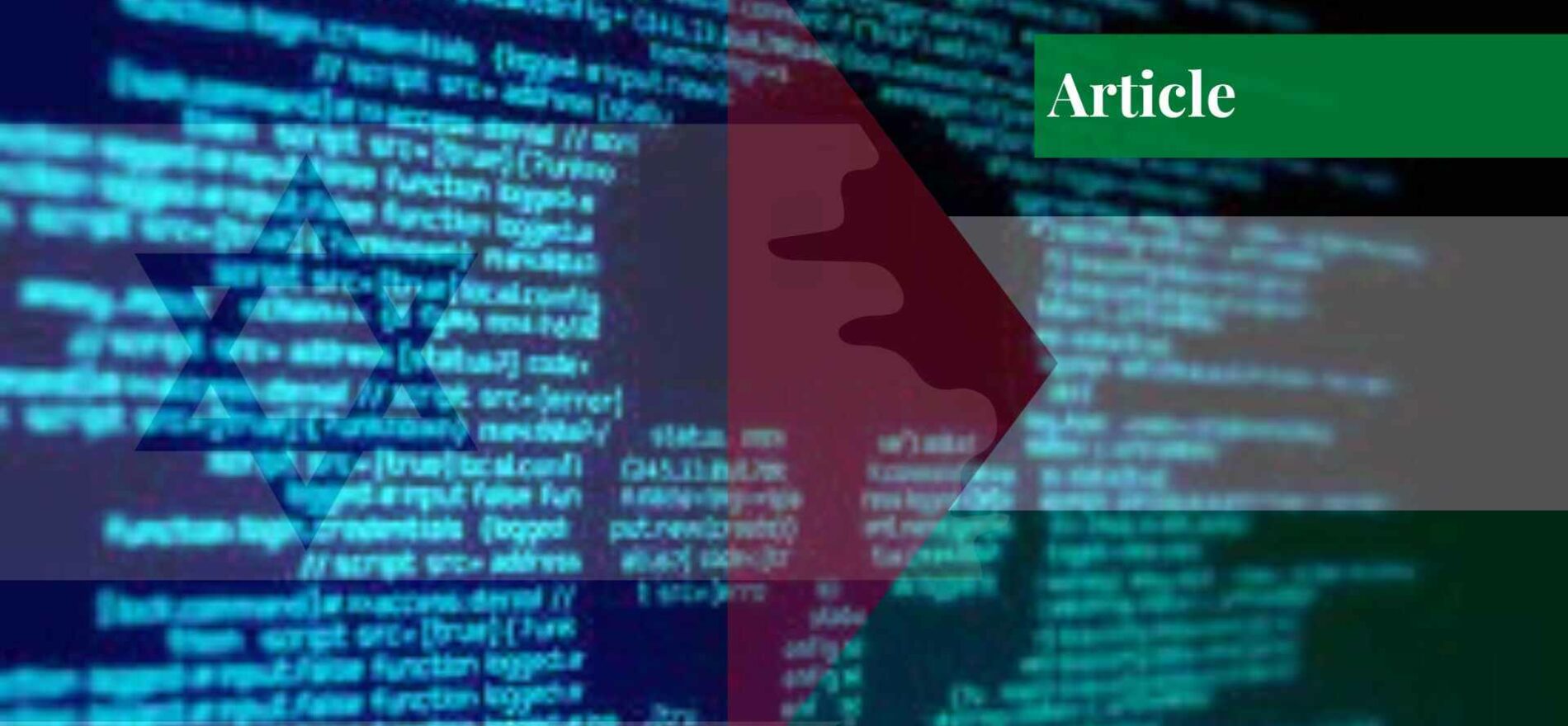Mr Babar Khan Akhunzada is a cyber-wizard and entrepreneur. He is the founder of SecurityWall, a cybersecurity firm focused on a hybrid auditing approach
The intensification of cyberwarfare in global conflicts is epitomized in the ongoing digital confrontation between Israel and Hamas. This dynamic arena of cyber conflict has become a critical front in their longstanding geopolitical strife. Israel, known for its technological prowess and sophisticated cyber capabilities, faces a persistent challenge from Hamas, an organization recognized by several countries, including the United States and the European Union, as a terrorist group. Hamas has increasingly embraced cyber tactics to compensate for its conventional military disparities.
Digital Fronts in the Israel-Hamas Conflict and PSYOPs
Recent events have marked a significant escalation in cyberwarfare tactics. Israeli websites and infrastructure have become targets for international hackers, with notable incidents including repeated attacks on the Jerusalem Post’s website. Groups from Gaza, Iran, and Russia are under suspicion, but attribution remains a challenge in cyberspace.
One alarming strategy used by hackers is the spread of misinformation. An example is the infiltration of an Israeli rocket warning app by Anon Ghost, which led to the broadcast of false alarms and threatening messages. These psychological tactics aim to create panic and confusion, undermining public trust in critical systems. Cybersecurity experts identified various actors carrying out psychological operations (PSYOPs) not limited to direct attacks but across social media platforms and messaging apps.
While some fabricated narratives completely, others used selective facts and omissions to promote distorted perspectives. Most masked their identities, posing as hacktivist collectives or journalists. The timing and coordination of these PSYOPs suggest deliberate efforts to manipulate perceptions about developments on the ground. Determining the ultimate sponsors and beneficiaries of this deception remains an ongoing challenge.
Bringing Influential Websites Down
Distributed Denial of Service (DDoS) attacks have been a common tool, aimed at overwhelming websites with traffic, causing them to crash. Over 100 Israeli sites have been affected, with the Jerusalem Post being a prominent victim. While groups like Anonymous Sudan have claimed responsibility, there’s skepticism among experts about their actual affiliations.
- Jerusalem Post Cyber Attack: The Jerusalem Post reported a significant cyber attack, attributed to Anonymous Sudan. This disrupted their website, but it was restored by the following day.
- AnonGhost’s RedAlert Exploit: A pro-Palestinian group, AnonGhost, exploited a vulnerability in the RedAlert app. This app, designed to warn of real-time rocket launches, was manipulated to send false alarms about a nuclear bomb.
- Attacks by Ghosts of Palestine: Another group, Ghosts of Palestine, claimed responsibility for attacks against various Israeli organizations including the Ministry of Foreign Affairs and Ben Gurion Airport.
This situation underscores the increasing complexity and international scope of cyberwarfare, especially in politically charged contexts like the Israel-Palestine conflict. The use of cyber attacks to further political agendas and the involvement of various groups from different countries highlights the evolving nature of global cyber threats.
Beyond website disruptions, there’s a growing concern over attacks on critical infrastructure. Hackers employing sophisticated methods, like using fake LinkedIn profiles to install malware, pose a serious risk. These attacks could potentially lead to devastating consequences such as shutting down power stations or other vital services.
The Russian and Iranian Angles
Attributing cyber attacks to specific state actors is complex. While there are suggestions of Russian involvement, particularly in light of strained Israel-Russia relations post-Ukraine conflict, direct links are hard to establish. Similarly, Iranian hackers’ involvement is a subject of speculation, given the historical context of Iran-Israel cyber confrontations.
Israel, recognizing the gravity of these threats, has been proactive in bolstering its cyber defenses. The establishment of the Israeli National Cyber Directorate in 2017 underscores this commitment. The country’s cyber strategy focuses on deterrence, resilience, and collaboration with intelligence and private sectors, making it a formidable force in cyber defense.
Pakistani Hacking Groups
Amid the escalation in the Israeli-Palestinian conflict, various hacker groups are actively participating in cyber attacks. Pro-Israeli hacktivists have been noted for their activities, including an instance where the official Hamas website was allegedly taken down by Indian hackers. In Pakistan, a group called “Team Insane PK” claimed to have hacked an Israeli hydroelectric power plant.
Other Pakistani hacker groups like Pakistan Cyber Hunter, Pakistani Leet Hackers, and Team HEROX have also been mentioned in reports by cybersecurity monitoring firms. This surge in cyber attacks against government websites and IT systems is seen as a direct response to the ongoing conflict, as observed by researchers.
Team Insane Pakistan has launched distributed denial-of-service (DDoS) attacks targeting various Israeli organizations, including Cyber 7 (Israel’s cybersecurity innovation hub), a tour company, and the Hadassah Hospital. Following these attacks, the Indonesian group Garnesia Team targeted the Sheba Medical Center with a DDoS attack. Team Insane Pakistan then shared a news story about Israeli hospitals going offline as a precaution against cyber attacks, accompanying the story with a taunting remark. The post ended with a call to action for all Muslim cyber armies to proceed with their activities.
Role of Cyberwarfare in Military Strategy and Insights
Israel’s military strategy is heavily focused on cyberspace, both offensive and defensive. The Israel Defense Forces (IDF) engage in cyber operations to complement traditional military activities. This approach is crucial for a country like Israel, which, despite its small size, has managed to develop one of the world’s most advanced cyber defense systems.
The cyberwarfare landscape in the Israeli-Palestinian conflict has escalated with 137 groups involved, exceeding those in the Russia-Ukraine conflict. Post the 7th October Hamas attacks on Israel, at least 22 new groups have emerged. Most of these groups are based in Asia, addressing long-standing regional grievances, and many are involved in the edition of #opIsrael. The most prevalent attack methods are DDoS and website defacement.
While numerous data breach and leak claims have been made, many are either disproven or based on old data. In terms of geographic representation, Bangladesh, Indonesia, and Malaysia are the main sources of anti-Israel cyber groups, whereas pro-Israel cyber groups are predominantly based in India. This situation illustrates the growing complexity and international nature of cyber warfare in the context of the Israeli-Palestinian conflict.
A Wake-Up Call for Cybersecurity in Global Conflicts
The Israel-Hamas cyber conflict highlights the need for robust cybersecurity measures, especially as the distinction between state and non-state actors in cyberwarfare becomes increasingly blurred. The international community must recognize the growing significance of cyber threats and develop collaborative strategies to mitigate these risks.
As the digital landscape evolves, so does the nature of conflict. The Israel-Hamas cyber confrontation is a stark reminder of this new reality. Understanding the dynamics of cyberwarfare, staying ahead of emerging threats, and fostering international cooperation are crucial for maintaining global security in the digital age.
As real-world tensions spilled into the online sphere, the information domain became an active front in the war for hearts and minds. Moving forward, the international community must find ways to counter false narratives without infringing on free expression. With technology’s role in conflicts continuing to grow, establishing information integrity will only gain importance.
If you want to submit your articles, research papers, and book reviews, please check the Submissions page.
The views and opinions expressed in this article/paper are the author’s own and do not necessarily reflect the editorial position of Paradigm Shift.



















